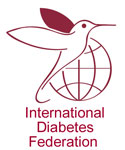
Top stories

Marketing & MediaWarner Bros. was “nice to have” but not at any price, says Netflix
Karabo Ledwaba 1 hour


Energy & MiningSouth Africa's hydrogen horizon brightens with R100m Wits-Air Liquide initiative
1 hour



More news


















With only five years left to achieve the UN's Millennium Development Goals, it is clear that, if the needs of Africa's poor are to be met, development dialogue must urgently address the rising incidence of diabetes on the continent, including the impact it is having on Africa's ailing healthcare systems. Urgent attention also needs to be given to improving treatment, as well as to educating rapidly-urbanising populations about the causes and dangers of the chronic condition.
Not only is the prevalence of diabetes increasing at an alarming rate, it is also a two-edged sword, known to affect indigenous poor people, living in slums or informal settlements disproportionately. And conversely, chronic illnesses like diabetes only serve to perpetuate poverty, which creates and fuels a vicious cycle.
Further, as developing countries often depend heavily on development aid, the recent fall-off in the flow of aid to Africa may be the straw that breaks the camel's back. Healthcare could be thrown into complete disarray, especially if we are unable to get NCDs, and especially diabetes, under control.
Left unchecked, the spread of non-communicable diseases (NCDs) like diabetes is set to cripple Africa's already-overstretched healthcare services.
"Few realise the devastating effect diabetes is having on the people and healthcare systems in Africa," says Professor Jean Claude Mbanya, president of the International Diabetes Federation. "Diabetes is a threat to public health and development that we have to address as a matter of extreme urgency."
It is estimated that a startling 12.1 million people are living with diabetes in Africa and this is thought to be just the tip of the iceberg, as many cases go undiagnosed. According to conservative estimates, as many as 24.2 million people on the continent could have impaired glucose intolerance (raised blood sugar), which could lead directly to them developing diabetes.
On a macro level, the World Economic Forum's 2010 Global Risks Report identifies NCDs as one of the most significant risks for businesses and national economies, rating it as presenting a similar cost risk to that of the global financial crisis. In Africa, this risk is exacerbated by underinvestment in infrastructure, and by a crisis in food, water and energy security. So much so that, by 2030, deaths from NCDs are expected to overtake deaths from such infectious diseases such as TB, malaria and HIV/Aids.
To date, policy makers have focused mainly on preventing the spread of infectious diseases, mainly because of their acute nature, but this has left millions of people with diabetes and other NCDs under-serviced by the healthcare system.
"In this situation, we cannot afford to take our eyes off the ball," adds Mbanya. "We need to throw our collective weight behind the implementation of the Diabetes Strategy for Africa, which was ratified at the IDF World Diabetes Congress in Cape Town in 2006. Health Leaders from Africa will convene in South Africa at the end of September for the, Diabetes Leadership Forum Africa 2010, as one of the activities to push the diabetes agenda forward for all African countries. If we fail to implement this integrated strategic plan for the management of diabetes and related health risks in all of the countries of the African Union, Africa's healthcare system could simply collapse under the load."
The International Diabetes Federation (IDF) is an umbrella organization of over 200 national diabetes associations in over 160 countries. It represents the interests of the growing number of people with diabetes and those at risk. The Federation has been leading the global diabetes community since 1950. IDF's mission is to promote diabetes care, prevention and a cure worldwide. Led by the International Diabetes Federation, the Unite for Diabetes campaign secured a United Nations Resolution on diabetes in December 2006. The Federation continues to lead the global effort to implement Resolution 61/225 under the Unite for Diabetes banner. The Resolution encourages UN Member States to develop national policies for the prevention, treatment and care of diabetes in line with the sustainable development of their health-care systems, taking into account the internationally agreed development goals, including the Millennium Development Goals. Together with its sister federations in the NCD Alliance, IDF spearheaded a global campaign which led to the United Nations General Assembly announcing a Non-communicable Disease (NCD) Summit involving Heads of State, in September 2011, to address the threat posed by NCDs to low- and middle-income countries.
For more information, visit www.idf.org.
Novo Nordisk is a global healthcare company with 87 years of innovation and leadership in diabetes care. The company also has leading positions within haemophilia care, growth hormone therapy and hormone replacement therapy. Headquartered in Denmark, Novo Nordisk employs more than 29,300 employees in 76 countries, and markets its products in 179 countries. Novo Nordisk's B shares are listed on the NASDAQ OMX Copenhagen (Novo-B). Its ADRs are listed on the New York Stock Exchange (NVO).
For more information, visit www.novonordisk.com/sustainability.